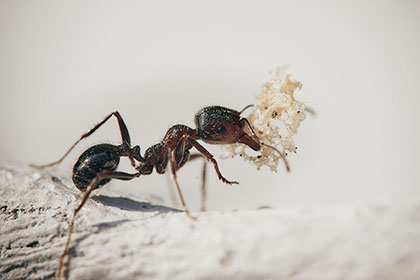After talking (sometimes in more than one article) about carpenter ants, sand ants and pharaoh ants, it is now the turn of the scent ants to steal the show!
In this article, we will answer 6 questions related to scent ants, namely:
- How to identify scent ants?
- Why the name “scent ant”?
- What is the behavior of scent ants?
- Are scent ants dangerous?
- How to prevent an infestation of odorous ants?
- What to do in the case of an infestation of odorous ants?
Read on for the answers.
How to identify scent ants?
Scent ants, with their 2.5 to 3.5 mm body size and brown or black color, are often confused with pavement ants. It is very difficult to differentiate them, unless you are an ant expert!
If you see ants walking around your house and you can’t identify them, the best solution is to contact us.
Why the name “scented ant”?
Scent ants actually have several names, such as “house ant” or “sugar ant”. However, most of the time, we use the name “scent ant”. Why?
This is because of the unpleasant odor that arises when a smelly ant is crushed. The smell is hard to describe, but some people compare it to a rotten coconut smell. Ark!
What is the behavior of scent ants?
Scent ants are found in huge colonies that can group between 2000 and 100 000 ants. When walking around, scent ants prefer a single file formation. To guide the ants that follow them, scent ants are inspired by Hansel and Gretel: they leave behind pheromones (chemical secretions), which the other ants use as GPS.
Are scent ants dangerous?
Unlike atomic bombs, scent ants are not a great danger to the human race.
However, they are a nuisance, and not just because of the smell they give off.
Indeed, if they come in contact with food, the excrements of these ants can contaminate you and your pets. Also, while pheromone trails are useful for ants, they are problematic for us because they can attract pests. Smelly ants + pests in the house = a slightly less cozy home.
How to prevent an infestation of odorous ants?
There are several things you can do to prevent a scent ant infestation. Here are some of them:
- Caulk your doors and windows.
- Quickly clean up any food spills on the floors, kitchen counter and in the pantry (especially sweet foods).
- Do not place firewood near your home.
What to do in the case of an infestation of odorous ants?
Unfortunately, scent ants are not only difficult to identify, but they are also difficult to exterminate. They are tenacious, the little tanners!
If you have odorous ants in your home, rather than going to great lengths to try to exterminate them, let the experts at Brisebois Extermination take care of them. For a free estimate, call us!

